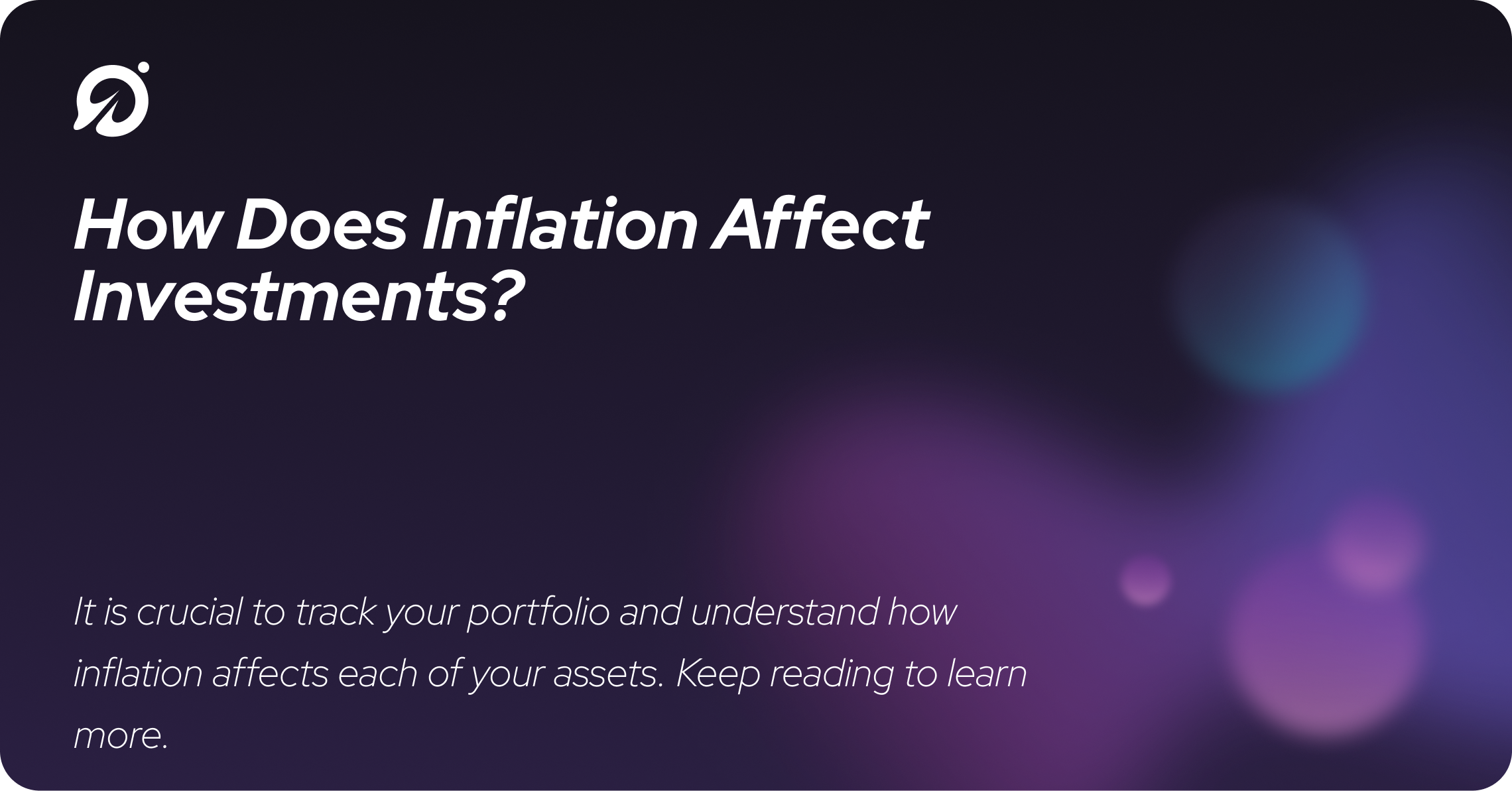How Does Inflation Affect Investments?
As inflation measures how quickly consumer goods and services prices rise, investors also carefully assess how their investment portfolios are performing concerning inflation. Certain investments thrive in times of high inflation while others utterly suffer.

Disclaimer: This is for informational purposes and is not meant to serve as financial or investing advice.
What Is Inflation?
Ultimately, inflation can be defined as the rise in prices throughout the economy, which translates to a decrease in buying power. During this period of inflation, it can feel like your dollar isn’t going as far, and it can affect your investments.
How Does Inflation Work?
Since inflation is considered an economy-wide trend of price increases from year to year, this tells investors how much of a return, in percentages, their investments need to make for them to maintain their standard cost of living.
When these prices inflate, it does not mean that the increases vary from product to product, but rather, it occurs throughout industries, sectors, and the entire country overall.
Inflation is measured by the Consumer Price Index (CPI), the Producer Price Index (PPI), and the Personal Consumption Expenditures Price Index (PCE). All use different measures to track the change in prices that consumers are paying and producers are receiving throughout the American economy.
Even though the thought of losing money seems negative, economists have gathered that small amounts of steady inflation yearly are a sign of a healthy economy. Inflation can also motivate individuals to invest more money rather than waste it in their sock drawers or under their mattresses.
On the contrary, inflation can be highly destructive to an economy if it becomes out of hand and cannot be reined in.
Understanding Inflation
The best way to understand inflation would be with an example. Suppose your average cost of a loaf of bread is $2, and the yearly inflation rate is 10%.
This means that the same loaf of bread will be 10% higher in price the following year, costing $2.20. Your income would need to increase yearly by at least the inflation rate to be sustainable.
How Does Inflation Affect Investments?
Inflation has the same effects on liquid assets as on other asset types. The only difference is that liquid assets appreciate over a shorter amount of time.
When high inflation rates, individuals and businesses tend to lean toward holding fewer liquid assets. This may be because people are in fear and are holding onto their money for more purchasing power rather than investing it.
We need to understand that liquid assets maintain a natural defense if inflation is on the rise. This combats losing buying power.
This is one of the principal reasons investors place money into stocks, bonds, mutual funds, and cryptocurrency to keep their savings as safe as possible from the adverse effects of inflation.
When inflation becomes a more significant issue, these investments can provide a safety net if you need extra funds.
The best way to protect your purchasing power would be to invest in inflation-protected securities and assets that move with inflation.
Fixed-Income Investments
There is an inverse relationship between interest rates and fixed-income assets. Fixed-income investments include corporate and government bonds and bank certificates of deposit (CDs).
With higher interest rates, interest payments on fixed-income assets often fall, which decreases your overall returns on these assets. These assets do not perform as well under rising inflation as other assets may.
Stocks
The stock market reflects investors' attitudes and expectations for the economic future.
As with most assets, inflation affects their value and interest rates. With all-time highs of inflation this year alone, the stock market has been taking a direct hit. The stock market sell-off has been an enormous indicator of the start of a recession.
Rising interest rates are generally bad news for most stocks, but certain types are negatively impacted more than others.
Real Assets
As gold is considered one of the safeguard assets against inflation, so are real assets, such as property and infrastructure (also known as real estate). Real assets have a positive correlation with inflation.
As inflation rises, typically, so do property prices and rent prices. So these investors can reap huge benefits from increased inflation rates.
This does not mean primary resident owners will benefit, as this asset is not cash-flow generating. But for real estate investors who have income properties, rising inflation rates create positive cash flow.
Commodities
Commodities such as gold and oil show substantial positive correlations with rising inflation prices but are also considered wildly volatile.
Inflation itself has a direct impact on the prices of commodities. Rising inflation drives up the prices of commodities and sometimes even their value.
So, as these prices go up and demand increases, this drives up the price even more. This means that inflation has a two-fold effect on commodity prices.
How Can You Detect Rising Inflation?
Fed Policies and Interest Rates
The most common way the federal reserve detects and measures inflation is with the Consumer Price Index for Urban Consumer (the CPI-U), which the Bureau of Labor Statistics produces.
The CPI-U shows changes in prices paid by urban consumers for a “representative basket of goods and services.” In other words, this measurement tracks the most common goods and services purchased on an average monthly basis with detailed surveys on what Americans spend their money on.
The four major categories of purchased goods are food, energy, commodities like cars and clothes, and services like rent and healthcare. Usually, food and energy are weighed most heavily.
On the contrary, rising interest rates usually help to curb rising inflation but, in doing so, can cause an overall downturn in the state of the economy or, even worse, a recession.
Oil Prices
In short, higher oil prices usually translate to higher production and transportation costs, leading to inflation and decreased living standards.
As this negatively impacts sustainable living for consumers, it is to the benefit of producers because they will generally see higher revenue rates.
So when you see oil prices rising, know that this can directly impact inflation.
Reduced Reliance on Imports
Demand-pull inflation rates will likely rise when there is reduced reliance on imports.
In other words, if the quantity of imports increases, inflation should be reduced, and citizens will be spending less on domestic goods.
What Causes Rising Inflation?
Many factors cause inflation to rise. Some of them include the following:
- Demand-Pull Inflation: This is when there is an increase in demand for goods and services but not enough supplies. Businesses are not able to scale their production quickly enough to meet up with demand.
- Cost-Push inflation: This occurs when there is an increase in not only the demand for goods and services but also an increase in production costs. Increases in raw materials or labor costs can cause businesses to raise prices to meet their profit margins.
- Devaluation occurs when the currency loses value compared to other currencies. So, for example, if the U.S. dollar loses value against the euro, it will take more U.S. dollars to convert to the same amount of euros. So, if a business imports its goods from Europe, it may need to raise prices to cover the increase in cost.
- Printing of more money: The printing of more money by central banks directly impacts inflation. If there is more money being circulated, the value will go down. Thus, the dollar's value overall is lower, and the cost of goods is higher to meet the value.
Is Inflation Better for Borrowers or Lenders?
Inflation can favor both borrowers and lenders, depending on the circumstance.
This has to do with the money supply. As mentioned before, when central banks are printing more paper money to go around, it can directly affect the prices of goods. This assumes that there is no economic change because it weighs itself out.
So then, inflation allows borrowers to repay lenders with money worth less than initially borrowed. This can benefit borrowers.
Vice versa, inflation causes higher prices for the same goods, increasing credit spending, raising interest rates, and benefitting lenders.
How Does Inflation Impact Crypto Investments?
More popular than gold, cryptocurrency investments have been the new way to hedge against inflation.
The well-renowned Bitcoin is ultimately a deflationary asset. This is why individuals use it to protect themselves against hyperinflation and the rising costs of everyday goods.
Unlike the printed dollar, crypto cannot be manipulated similarly by changing interest rates and increasing bills being circulated.
Bitcoin’s supply will never exceed 21 million, making it an attractive and inflation-resistant store of value.
As cryptocurrency is still highly volatile and the price movements can fluctuate relatively quickly, like Bitcoin's drastic price drop in May of 2022, many investors have pulled their money out of crypto platforms and placed them back into gold.
This makes crypto a less secure option for investors. For those unsure about crypto's reliance, investing in safer crypto like stablecoins that are USD- backed and approved by the New York State Department of financial services may be a wise choice.
And if you still want to beat inflation with crypto, another method would be trading forex and different fiat currencies.
The Bottom Line
Inflation is a complex economic concept that has its pros and cons. When it comes to investments, it is vital to keep a close eye on your portfolio and diversify where necessary.
As for cryptocurrency, here at Pluto, we can help you make the best investment decisions with ease.
Sources:
What Is Inflation? How Does It Work? | Forbes Advisor
What Is Inflation? How Does It Work? | Forbes Advisor
Inflation-Protected Security (IPS) Definition | Investopedia
How Does Inflation Affect Fixed-Income Investments? | Investopedia
How Does Inflation Affect Stocks? | Forbes Advisor
How Rising Inflation Impacts Real Estate Investments | Forbes
Effect of Higher Oil Prices | Economics Help
